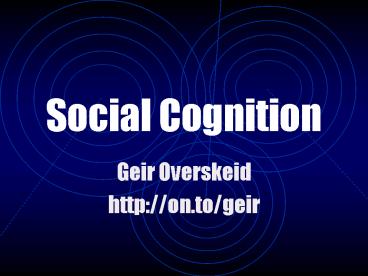Social Cognition PowerPoint PPT Presentation
1 / 18
Title: Social Cognition
1
Social Cognition
- Geir Overskeid
- http//on.to/geir
2
Social cognition What are we talking about?
- Definition How we think about social relations
and the things that influence those relations - This definition comes in many variations
- The need for social cognition is often thought to
have been a driving force behind the evolution of
human cognitive abilities
3
Two important concepts
- Intuition (System 1)
- Reasoning (System 2)
4
-
From Kahneman (2003)
5
Another important concept
- Accessibility, not to be confused with
availability. - All aspects of a situation, a thing, a person
tend not to be equally accessible to an observer.
What is easily accessible often becomes the basis
for judgments and decisions that are mainly
intuitive (Syst. 1) - Most decisions are mainly intuitive
6
Accessibility
7
The fundamental error of attribution
- In explaining the behavior of others, we tend to
overestimate the importance of the actors stable
dispositions and underestimate the power of the
situation - The fundamental attribution error has been found
wherever researchers have looked, but seems
somewhat weaker in East Asia - The exception Explaining ones own behavior. Her
the pattern may be the other way around.
8
Intuitive judgments
- Intuitive judgments leave little room for
uncertainty People often feel strongly that
this is the way it is. - Normally, only one alternative is represented
- Heuristics form the basis of many intuitive
judgments
9
Heuristics
- Heuristics are often useful, but can cause bias
and lead to irrational behavior - Behavior is rational when it is efficient in
reaching the actors goal - We often overestimate the degree to which we
engage in reasoning. To a great extent, choices
are based on heuristics and intuition.
10
An example Representativeness
- The heuristic known as representativeness may
strongly influence our assumptions regarding a
persons group membership, or as to whether she
resembles a stereotype. Let us look at Linda - Linda is 31 years old, single, outspoken, and
very bright. She majored in philosophy. As a
student, she was deeply concerned with issues of
discrimination and social justice, and also
participated in anti-nuclear demonstrations. - Is Linda a bank teller? Is she a feminist and a
bank teller?
11
Priming - two modern classics
- John Bargh et al. (1996)
- Old age is unconsciously primed by way of a
scrambled sentence test. Result Participants
walk more slowly. - White participants who have subliminally seen the
face of a young Black male become more hostile
than those who have subliminally seen the face of
a young White male.
12
Compensation
- If people feel they should compensate for
irrelevant influence, they often compensate too
strongly. Some examples - Priming (contrast)
- Mood
- Liking
- When theres nothing to compensate for
13
Other aspects of intuition
- A photograph may be sufficient basis for a good
appraisal of personality - Other peoples facial expressions may affect us
unconsciously - Lacking this kind of intuition may increase a
persons risk of having social problems
14
Nosce te ipsum
- People often arent very good at understanding
the causes behind their behavior - The basis we have for understanding our own
behavior may not be much better than our starting
point for understanding others
15
Consciousness as cause
- Simply thinking about an action before it takes
place may make people feel they caused it - Even willed processes may not be governed by
conscious will
16
What can be unconscious?
- Most things
- John Bargh assumes that more 99 per cent of human
behavior is unconsciously controlled - Consciousness probably exists primarily for
planning and simulation
17
What can be unconscious?
- Among other things
- Causes
- What affects my mood? Why did I fall in love? How
did I get that idea? - Processes
- How did I solve that problem? Why does a
situation look the way it does to me? - Social learning
- I thought I learnt A, but it was B instead, and
also C.
18
It takes one to know one
- We overestimate the extent to which other people
understand or think the way we do - Exception Self-serving bias. We tend to see our
strengths as unique. Our weaknesses, on the other
hand, we see as more common than they really are.

